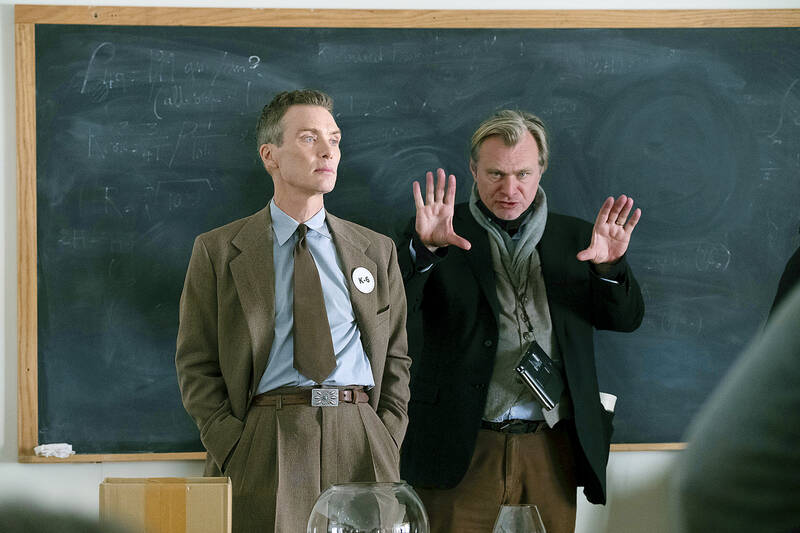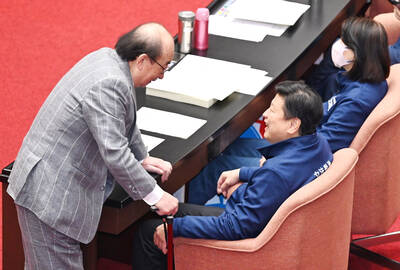The story of the invention of the atomic bomb told in the new film Oppenheimer is a “warning” to the world as we grapple with artificial intelligence, insists the movie’s director Christopher Nolan.
The British-born maker of Memento, Dunkirk and the Batman trilogy said he believes a lot of the anguish around technology “in our imagination stems from (Robert) Oppenheimer,” the physicist who helped invent nuclear weapons during World War II.
What he and his team at the Los Alamos Laboratory in the US did was “the ultimate expression of science... which is such a positive thing, having the ultimate negative consequences,” Nolan said.

Photo: AP
Like back then, the startling advances in artificial intelligence (AI) are raising similar fears about the dangers of a technology with potentially uncontrollable consequences.
Some worry that AI could escape its creators and endanger humanity, much like scientists and others fretted eight decades ago with the dawn of the nuclear age.
“That was a moment in history. This is one too,” Nolan’s star Cillian Murphy — who plays the haunted scientist — said while the pair were in Paris to promote the film, which opens across the globe and Taiwan this weekend.
“Artificial intelligence researchers refer to the present moment as an ‘Oppenheimer moment,’” said Nolan, referring to the first atomic tests, when some feared nuclear fission would lead to an uncontrolled chain reaction that would pulverize the entire planet. Those now working on AI “look at his story for some guidance as to what is their responsibility — as to what they should be doing.”
“But I don’t think it offers any easy answers. It is a cautionary tale. It shows the dangers.”
“The emergence of new technologies is quite often accompanied by a sense of dread about where that might lead,” he said.
DILEMMA
Nolan’s drama turns on the dilemma this posed for the scientists working on the Manhattan Project, the codename of the drive to develop the bombs that were later dropped on Hiroshima and Nagasaki.
“They had lived through World War I and they were trying to end World War II,” he said.
Oppenheimer argued in vain for international control of nuclear weapons, hoping it would lead to peace. The director said many would argue that “actually some stability in the world has been achieved through the existence of these weapons.
“Personally, I don’t find that reassuring, but it just goes to show there are absolutely no easy answers to the dilemma.”
The war in Ukraine has reawakened the threat of nuclear Armageddon raising tensions between the superpowers not seen since the end of the Cold War. Actor Matt Damon, who plays General Leslie Groves, the head of the Manhattan Project, said the last year has been a reality check that the danger of nuclear disaster is still very much there.
“How did I forget about this? It’s like the Cold War ended and my brain played a trick on me and said, ‘OK, let’s put that away, you don’t have to worry about that anymore’ — which is absurd.”
But as soon as Russia invaded Ukraine “suddenly overnight it became the most important thing for us all to think about again,” said the 52-year-old star.
Oppenheimer is facing off against Barbie in the biggest clash of Hollywood summer blockbusters, with both opening on the same day in a duel the media has dubbed “Barbenheimer.”

Taiwan doesn’t have a lot of railways, but its network has plenty of history. The government-owned entity that last year became the Taiwan Railway Corp (TRC) has been operating trains since 1891. During the 1895-1945 period of Japanese rule, the colonial government made huge investments in rail infrastructure. The northern port city of Keelung was connected to Kaohsiung in the south. New lines appeared in Pingtung, Yilan and the Hualien-Taitung region. Railway enthusiasts exploring Taiwan will find plenty to amuse themselves. Taipei will soon gain its second rail-themed museum. Elsewhere there’s a number of endearing branch lines and rolling-stock collections, some

Could Taiwan’s democracy be at risk? There is a lot of apocalyptic commentary right now suggesting that this is the case, but it is always a conspiracy by the other guys — our side is firmly on the side of protecting democracy and always has been, unlike them! The situation is nowhere near that bleak — yet. The concern is that the power struggle between the opposition Chinese Nationalist Party (KMT) and their now effectively pan-blue allies the Taiwan People’s Party (TPP) and the ruling Democratic Progressive Party (DPP) intensifies to the point where democratic functions start to break down. Both

The Democratic Progressive Party (DPP), Chinese Nationalist Party (KMT), and the country’s other political groups dare not offend religious groups, says Chen Lih-ming (陳立民), founder of the Taiwan Anti-Religion Alliance (台灣反宗教者聯盟). “It’s the same in other democracies, of course, but because political struggles in Taiwan are extraordinarily fierce, you’ll see candidates visiting several temples each day ahead of elections. That adds impetus to religion here,” says the retired college lecturer. In Japan’s most recent election, the Liberal Democratic Party lost many votes because of its ties to the Unification Church (“the Moonies”). Chen contrasts the progress made by anti-religion movements in

This was not supposed to be an election year. The local media is billing it as the “2025 great recall era” (2025大罷免時代) or the “2025 great recall wave” (2025大罷免潮), with many now just shortening it to “great recall.” As of this writing the number of campaigns that have submitted the requisite one percent of eligible voters signatures in legislative districts is 51 — 35 targeting Chinese Nationalist Party (KMT) caucus lawmakers and 16 targeting Democratic Progressive Party (DPP) lawmakers. The pan-green side has more as they started earlier. Many recall campaigns are billing themselves as “Winter Bluebirds” after the “Bluebird Action”